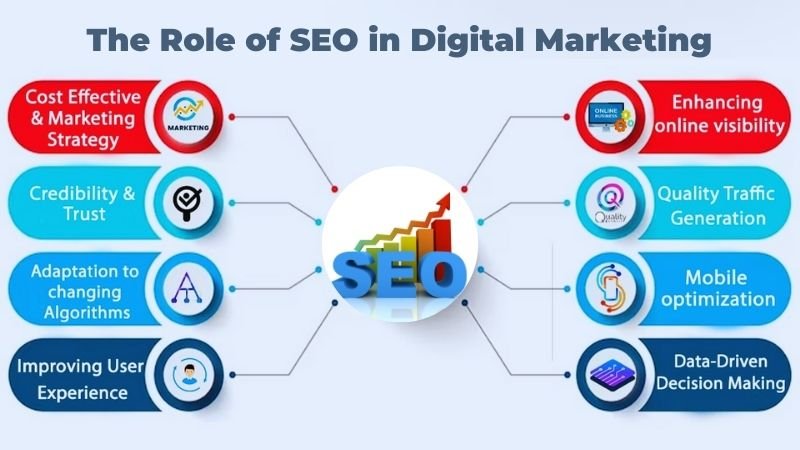In today’s digital landscape, mastering Search Engine Optimization (SEO) is crucial for any business aiming to thrive online. SEO serves as the backbone of digital marketing, driving organic traffic, improving search engine rankings, and ultimately boosting visibility and profitability. But what exactly is SEO, and why is it so important? This beginner’s guide will explore the essential aspects of SEO and how it integrates into the broader scope of digital marketing.
What is SEO?
Understanding the Basics of SEO
SEO, or Search Engine Optimization, refers to the practice of enhancing a website’s visibility on search engines like Google, Bing, and Yahoo. The goal is to rank higher in search engine results pages (SERPs) for specific keywords and phrases relevant to your business.
The Core Components of SEO
SEO can be broken down into three main components:
- On-Page SEO: This involves optimizing individual pages on your website to rank higher and earn more relevant traffic. It includes elements like content quality, keyword usage, meta tags, and internal linking.
- Off-Page SEO: Off-Page SEO refers to activities outside your website that influence your rankings, such as backlinks, social media engagement, and brand mentions.
- Technical SEO: This focuses on the backend of your website, ensuring that it’s free of technical issues that could impede search engine crawling and indexing. Examples include site speed, mobile-friendliness, and XML sitemaps.
Why is SEO Important in Digital Marketing?
The Impact of SEO on Business Growth
SEO is a critical component of digital marketing because it directly affects your website’s visibility and ranking on search engines. The higher your site ranks, the more likely you are to attract potential customers.
Driving Organic Traffic
Organic traffic, which comes from non-paid search results, is a key indicator of SEO success. Unlike paid advertising, which can be costly and temporary, organic traffic is sustainable and cost-effective over time.
Building Credibility and Trust
Ranking on the first page of Google or other search engines enhances your brand’s credibility. Users tend to trust websites that appear in top positions, associating higher rankings with authority and reliability.
Enhancing User Experience
SEO isn’t just about pleasing search engines; it’s also about improving the user experience. Elements like fast-loading pages, mobile optimization, and well-structured content contribute to both better SEO and a more enjoyable experience for visitors.
Key SEO Strategies for Beginners
As a beginner, focusing on fundamental SEO techniques can set a strong foundation for your digital marketing efforts.
Keyword Research and Optimization
Keywords are the terms or phrases that users type into search engines. Effective SEO starts with thorough keyword research to identify the words and phrases most relevant to your audience.
- Tools for Keyword Research: Google Keyword Planner, Ahrefs, and SEMrush are popular tools to help you find high-volume, low-competition keywords.
- On-Page Keyword Optimization: Once you’ve identified your keywords, strategically place them in your content, titles, meta descriptions, and headers.
Quality Content Creation
Content is king in the world of SEO. Search engines favor websites that provide valuable, relevant, and engaging content.
- Content Types: Blog posts, articles, infographics, videos, and podcasts can all contribute to your SEO strategy.
- Content Length and Structure: Longer, well-structured content tends to rank better. Use headings (H1-H6 tags), bullet points, and short paragraphs to improve readability.
Link Building
Link building involves acquiring hyperlinks from other websites to your own. These backlinks are seen as votes of confidence by search engines.
- Internal Links: Linking to other pages within your own website helps search engines understand the structure of your site.
- External Links: Earning backlinks from reputable sites can significantly boost your SEO efforts.
Technical SEO Basics
While technical SEO might seem daunting at first, focusing on a few key areas can make a significant difference.
- Site Speed: Ensure your website loads quickly by optimizing images, using a content delivery network (CDN), and minimizing code.
- Mobile Optimization: With the majority of searches happening on mobile devices, having a mobile-friendly website is crucial.
- Secure Website: Use HTTPS to protect your site and build trust with users.
Common SEO Mistakes to Avoid
Pitfalls That Can Harm Your SEO Efforts
SEO is a long-term strategy, and making certain mistakes can hinder your progress. Here are some common pitfalls to avoid:
Keyword Stuffing
Overloading your content with keywords can do more harm than good. Search engines penalize sites that engage in this practice, leading to lower rankings.
Ignoring Meta Descriptions and Title Tags
Meta descriptions and title tags are vital for both SEO and user engagement. Neglecting these elements can result in missed opportunities for higher click-through rates (CTR).
Neglecting Mobile Users
With more users accessing the web via mobile devices, failing to optimize for mobile can lead to poor user experience and lower search rankings.
Buying Backlinks
While backlinks are important, purchasing them can lead to penalties from search engines. Focus on earning backlinks organically through high-quality content.
FAQs About SEO in Digital Marketing
Q1: How long does it take to see results from SEO?
A1: SEO is a long-term strategy. It can take anywhere from 3 to 6 months to start seeing noticeable results, depending on factors like competition, keyword difficulty, and the quality of your SEO efforts.
Q2: Can I do SEO on my own, or do I need to hire an expert?
A2: While you can certainly learn and implement basic SEO strategies on your own, hiring an expert can accelerate your progress and ensure more advanced techniques are properly executed.
Q3: How often should I update my website’s content for SEO purposes?
A3: Regularly updating your content is crucial for SEO. Aim to refresh your content every few months, especially for pages that generate the most traffic.
Q4: Is SEO the same for all search engines?
A4: While the principles of SEO apply broadly across search engines, there are subtle differences. For example, Google favors mobile-friendly sites, while Bing places more emphasis on social signals.
Q5: What role does social media play in SEO?
A5: Social media doesn’t directly impact SEO, but it can increase visibility and drive traffic to your site, which can indirectly improve your search rankings.
Conclusion
SEO is an indispensable part of any digital marketing strategy. By understanding the basics and avoiding common mistakes, beginners can lay a solid foundation for online success. Remember, SEO is a long-term investment that requires patience, consistency, and ongoing effort. As search engines continue to evolve, staying informed and adapting your strategies will be key to maintaining and improving your search engine rankings.
By following this guide, you’re well on your way to harnessing the power of SEO to grow your business and succeed in the digital world.



